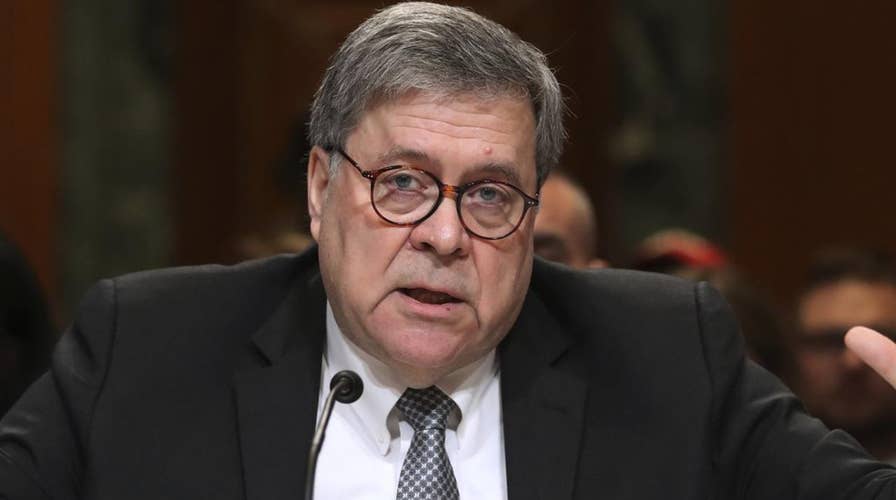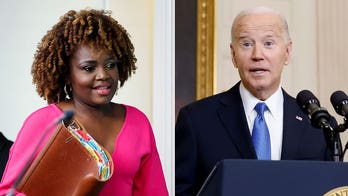Will the release of the redacted Mueller report change anything?
Republican strategist Ned Ryun on what he expects from the Mueller report release.
Attorney General William Barr on Thursday affirmed that Special Counsel Robert Mueller found no evidence of collusion between members of the Trump campaign and the Russians during the 2016 presidential election, as he tangled with reporters at a press conference shortly before releasing Mueller's report to Congress and the public.
The attorney general used the DOJ appearance to defend his handling of the report, amid criticism from congressional Democrats. He rejected the suggestion he's trying to protect President Trump, and then swatted down another question about whether it was strange that Mueller himself was not there.
"No, it's not. It’s a report he did for me—as the attorney general," Barr said, adding that he was outlining the decisions he made "since these reports are not supposed to be made public."
Barr was joined by Deputy Attorney General Rod Rosenstein as he outlined the findings from Mueller's investigation and explained their process for review and their decisions to redact certain material in the report.
"After nearly two years of investigation, thousands of subpoenas, and hundreds of warrants and witness interviews, the Special Counsel confirmed that the Russian government-sponsored efforts to illegally interfere with the 2016 presidential election but did not find that the Trump campaign or other Americans colluded in those schemes," Barr said, adding that Americans "should be grateful" for the findings.
He said that Mueller's report also went on to "consider whether certain actions of the president could amount to obstruction of the Special Counsel investigation."
Barr touched on some critical points, explaining that Trump is not invoking executive privilege over any portions of the report, though other categories of material will be redacted. He also revealed that the White House counsel, as well as Trump's personal lawyer, were able to review a redacted version of the report in advance.
He said he will release that redacted version to Congress at 11 a.m. ET Thursday, describing the redactions as "limited." It will then be posted publicly.
But as the DOJ tangles with Congress over redactions, Barr vowed to make a less-redacted version available to certain lawmakers.
Barr, meanwhile, sought to head off another controversy during his press conference over the issue of obstruction of justice. The Mueller probe did not reach a conclusion on whether the president committed this offense, but Barr and Rosenstein determined there was not sufficient evidence on that front.
"As I addressed in my March 24th letter, the Special Counsel did not make a traditional prosecutorial judgment regarding this allegation. Instead, the report recounts ten episodes involving the President and discusses potential legal theories for connecting these actions to elements of an obstruction offense," Barr explained. "After carefully reviewing the facts and legal theories outlined in the report, and in consultation with the Office of Legal Counsel and other Department lawyers, the Deputy Attorney General and I concluded that the evidence developed by the Special Counsel is not sufficient to establish that the President committed an obstruction-of-justice offense."
He also said that while he and Rosenstein "disagreed with some of the Special Counsel’s legal theories and felt that some of the episodes examined did not amount to obstruction as a matter of law, we did not rely solely on that in making our decision."
Barr said he would release the report to chairmen and ranking members of both the House and Senate Judiciary Committees late Thursday morning, and following its transmission to those congressional leaders, would release the report to the public through the Justice Department's website.
Barr explained that the redactions were "compelled by the need to prevent harm to ongoing matters and to comply with court orders prohibiting the public disclosure of information bearing upon ongoing investigations and criminal cases."
Congressional Democrats blasted Barr even before he took the podium over the decision to hold the press conference before the report’s release, with some demanding that he cancel Thursday’s event. House Judiciary Committee Chairman Jerrold Nadler, D-N.Y., called it “unnecessary and inappropriate” and “designed to shape public perceptions of the report before anyone can read it.”
House Speaker Nancy Pelosi, D-Calif., and Senate Minority Leader Chuck Schumer, D-N.Y., also issued a joint statement prior to the press conference, slamming Barr’s credibility and calling Mueller to testify in a public hearing before Congress.
TRUMP BLASTS RUSSIA PROBE AS 'HOAX' AND 'HARASSMENT' AHEAD OF MUELLER REPORT RELEASE
“Attorney General Barr’s regrettably partisan handling of the Mueller report, including his slanted March 24th summary letter, his irresponsible testimony before Congress last week, and his indefensible plan to spin the report in a press conference later this morning—hours before he allows the public or Congress to see it –have resulted in a crisis of confidence in his independence and impartiality,” they said.
“We believe the only way to begin restoring public trust in the handling of the Special Counsel’s investigation is for Special Counsel Mueller himself to provide public testimony in the House and Senate as soon as possible.”
The statement was the latest sign that the Mueller report release will not end Washington’s wars over the Russia probe.
But on Thursday, Barr vowed to work with Congress to "accommodate their legitimate oversight interests with respect to the Special Counsel's investigation."
"Given the limited nature of the redactions, I believe that the publicly released report will allow every American to understand the results of the Special Counsel’s investigation," Barr explained. "Nevertheless, in an effort to accommodate congressional requests, we will make available to a bipartisan group of leaders from several Congressional committees a version of the report with all redactions removed except those relating to grand-jury information."
Barr explained that those members of Congress "will be able to see all of the redacted material for themselves – with the limited exception of that which, by law, cannot be shared," referencing grand jury material included in the report.
Democrats have been hammering Barr and the Trump administration over the handling of Mueller’s report since the special counsel transmitted it to the Justice Department last month. Barr, with the help of Rosenstein, released a four-page summary of the special counsel’s findings throughout his almost two-year-long investigation.
Barr’s summary said that Mueller and the special counsel team found no evidence of collusion between members of the Trump campaign and the Russians during the 2016 presidential election. The special counsel was also reviewing whether the president obstructed justice in any way, but did not come to a conclusion on the matter, instead, kicking the decision back to the Justice Department.
After a review by Barr and Rosenstein, the two determined that the evidence found in the investigation was “not sufficient to establish that the president committed an obstruction-of-justice offense.”
But congressional Democrats are likely to home in on the evidence found with relation to the allegations of obstruction of justice and could use it in their sweeping Trump-related investigations.
The president’s legal team, in anticipation of obstruction of justice claims in the report, has prepared their own report to counter the allegations.
“They assumed all along that there was going to be a finding of no collusion, so the rebuttal is about obstruction,” a source close to Trump’s legal team told Fox News. “They are preparing a rebuttal to presumed allegations which will be refuted.”
TRUMP LEGAL TEAM PREPARES MUELLER COUNTER-REPORT, FOCUSING ON OBSTRUCTION ALLEGATIONS
Democrats also blasted Barr for his plan to redact portions of the report—including grand jury material, information the intelligence community believes would reveal intelligence sources and methods, any material that could interfere with ongoing prosecutions and information that could implicate the privacy or reputational interests of “peripheral players.”
Barr explained last week, though, that the president was not one of the “peripheral players” whose reputation needed protection.
Nadler, D-N.Y., is prepared for a legal battle with the administration, saying recently he is prepared to “very quickly” issue subpoenas for the full report should it be heavily redacted.





